Abstract
OBJECTIVE: To elucidate family physicians' motivations concerning early intervention for alcohol use and their perceived barriers to such intervention. DESIGN: Qualitative study with the use of focus groups and semistructured interviews. SETTING: Community-based, fee-for-service family-medicine practices in London, Ont. PARTICIPANTS: Twelve focus-group participants recruited through telephone contact by two family physicians on the project team. Participants were required to be physicians in family practice in London. Twelve interview participants recruited through a grand-rounds presentation at two local hospitals. Participants were required to be physicians in a community-based family practice in which primary care was not delivered by residents and to have agreed to participate in all phases (e.g., needs assessment, training and evaluation) of a training program on interventions to help patients reduce alcohol consumption or quit smoking. MAIN OUTCOME MEASURES: Motivations concerning early intervention for alcohol use and perceived barriers to such intervention, as identified by physicians. RESULTS: Physicians in the focus groups and those interviewed endorsed their role in helping patients to reduce alcohol consumption and cited several reasons for the importance of that role. There was strong support for viewing alcohol use as a lifestyle issue to be dealt with in the context of a holistic approach to patient care. Participants cited many barriers to fulfilling their role and were particularly concerned about the appropriateness of asking all adolescent and adult patients about alcohol use, even at visits intended to discuss other issues and concerns. Physicians gave several motivations for improving their work in reduction of alcohol consumption, including their current frustration with the lack of a systematic strategy or tangible materials to help them identify and manage patients. CONCLUSIONS: Interventions with patients who use alcohol should be framed in the context of a holistic approach to family medicine. Qualitative knowledge of the motivations and barriers affecting physicians can inform future research and educational strategies in this area.
Full text
PDF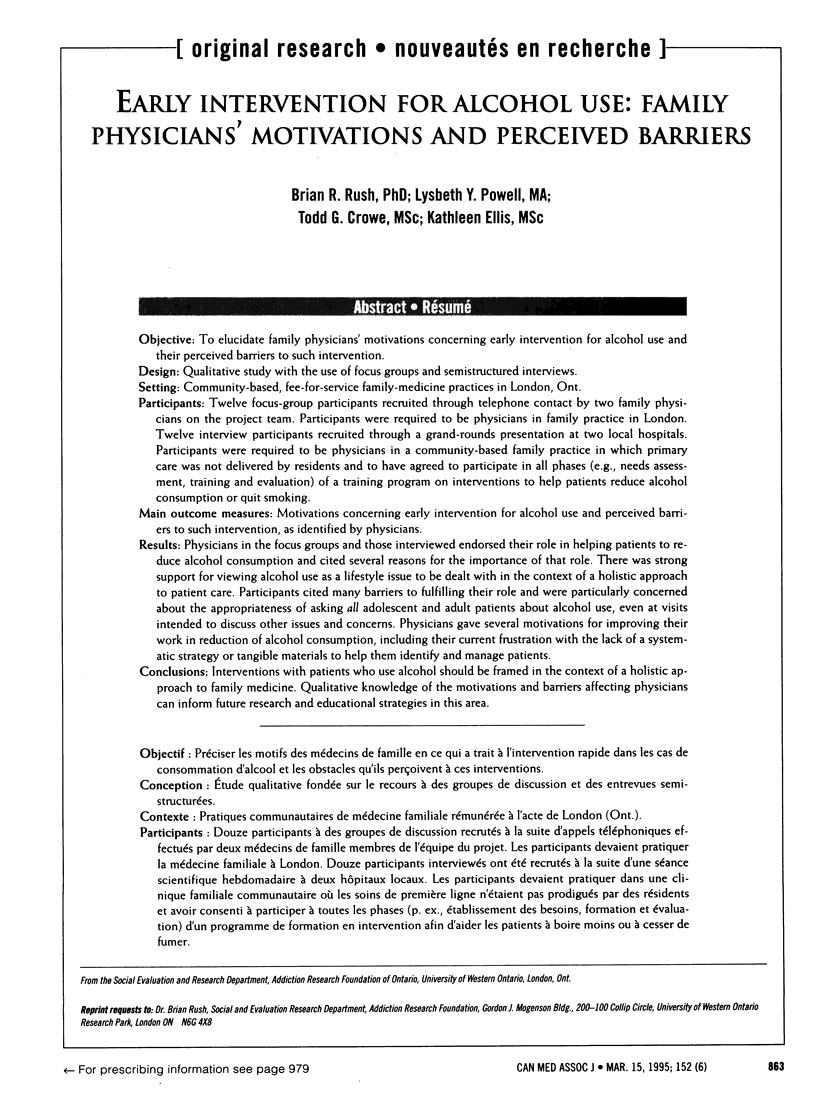
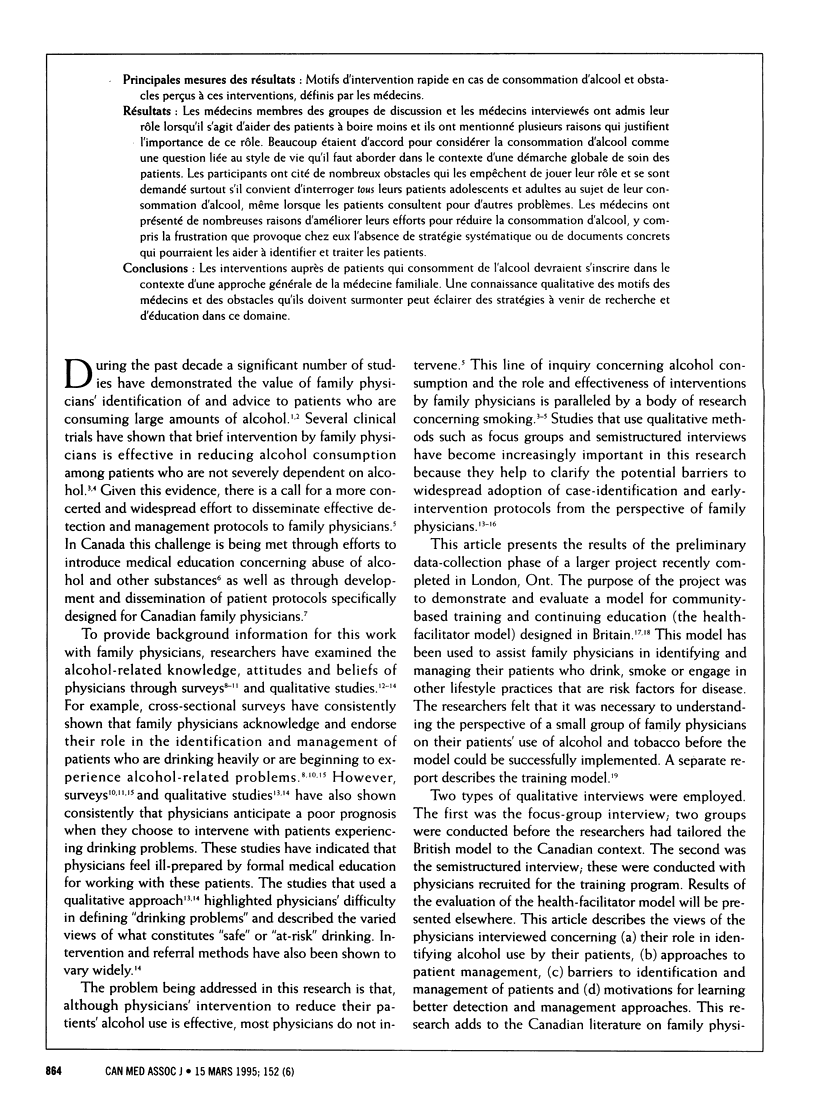
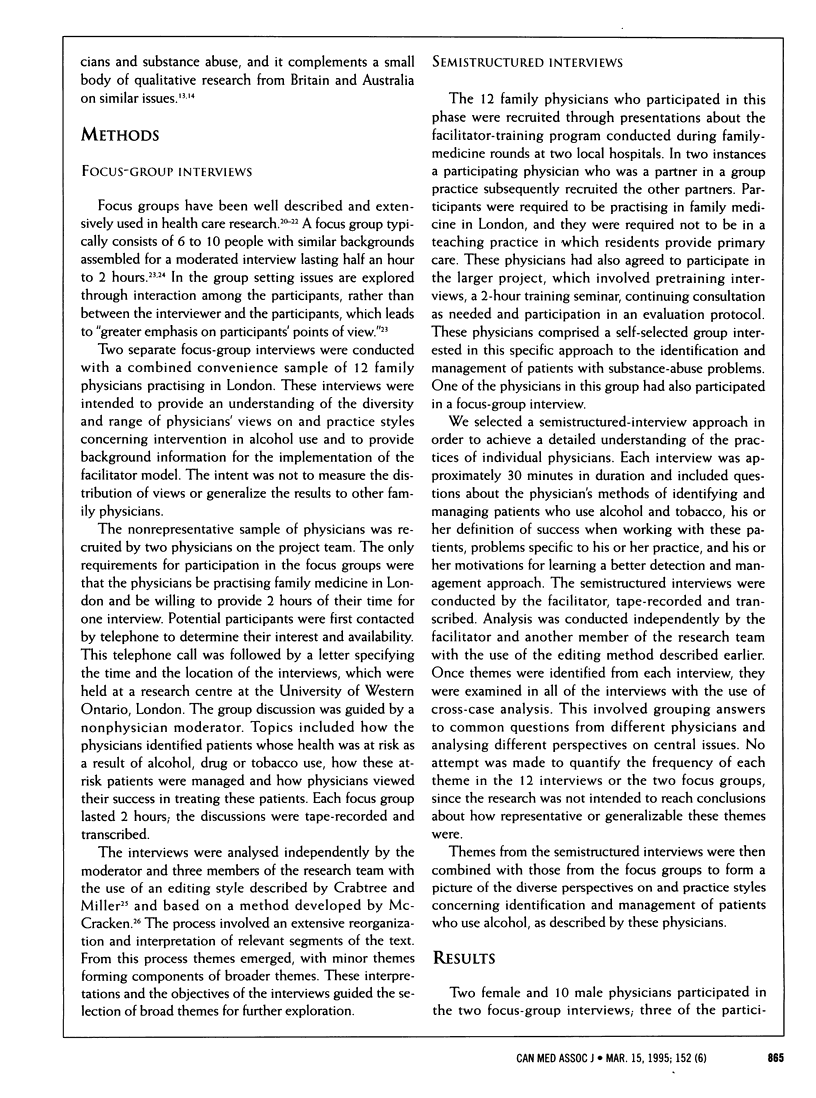
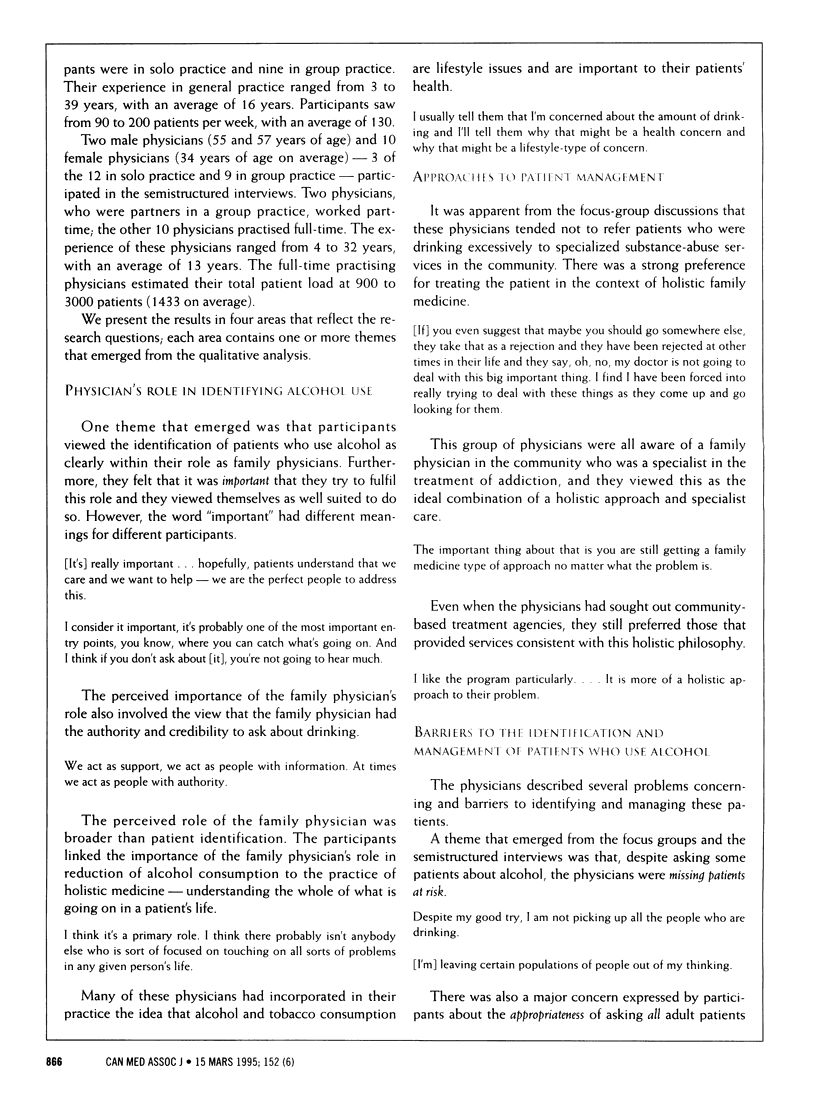
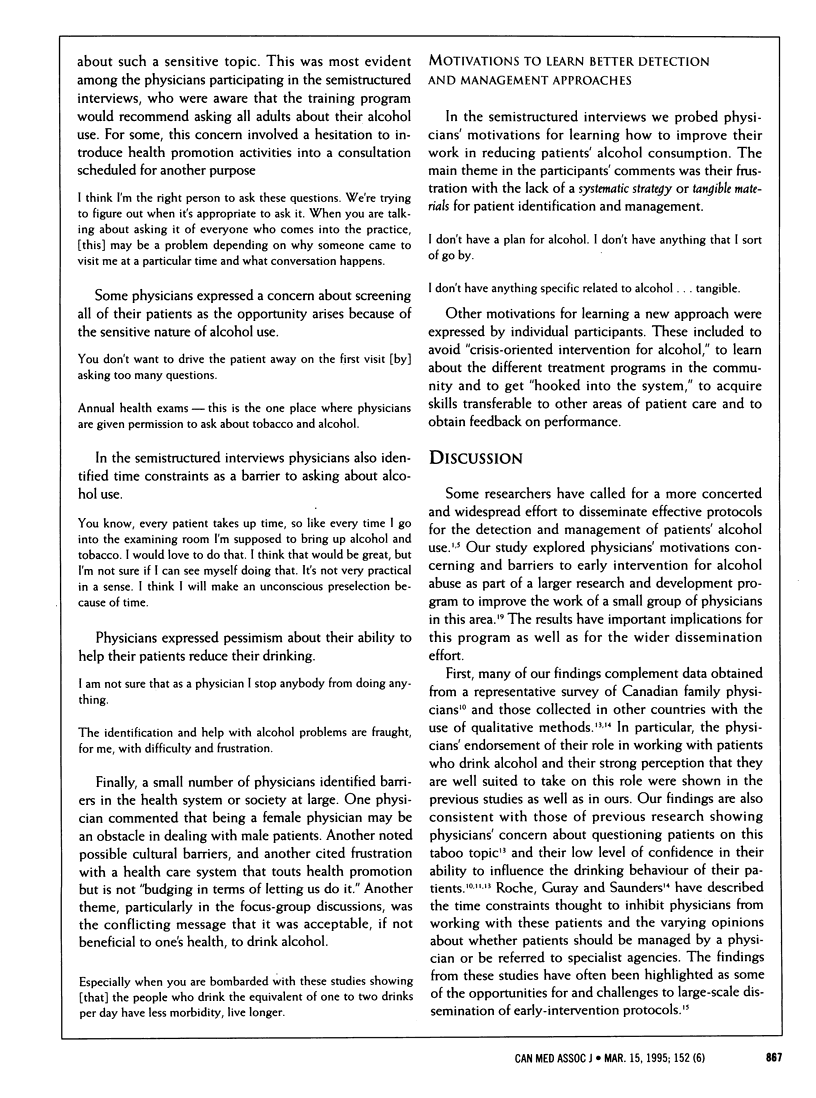
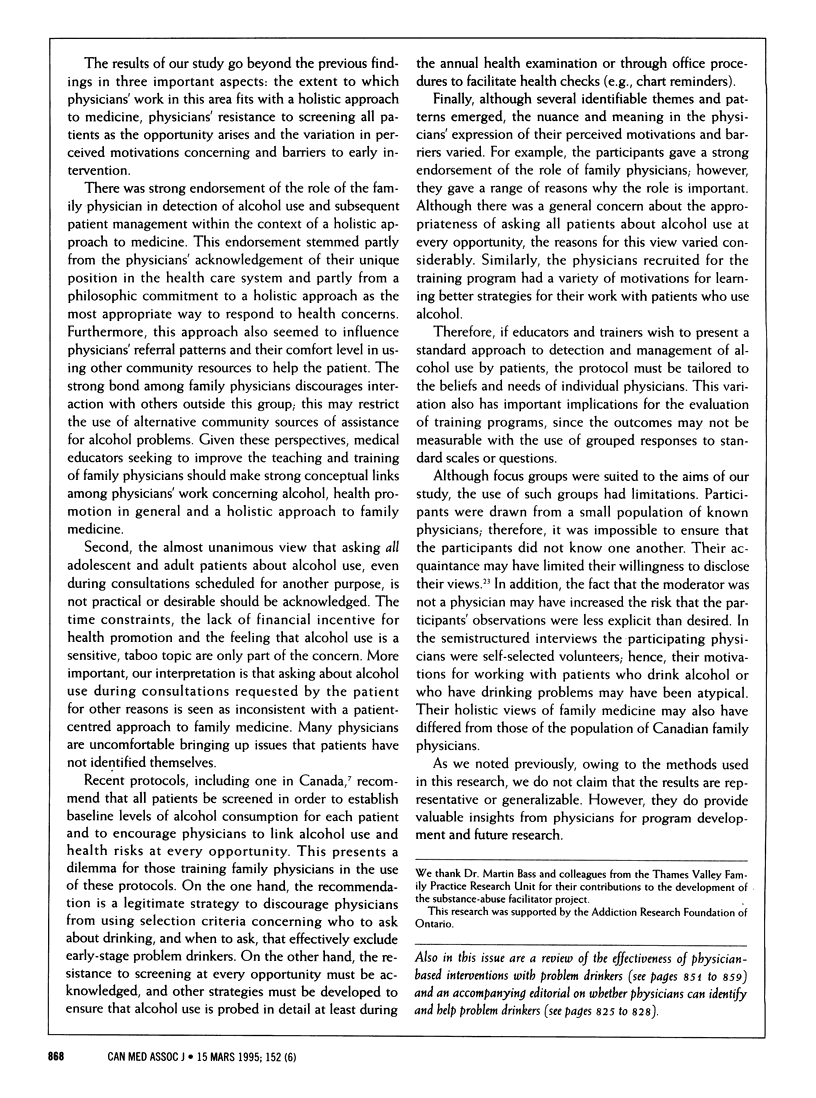
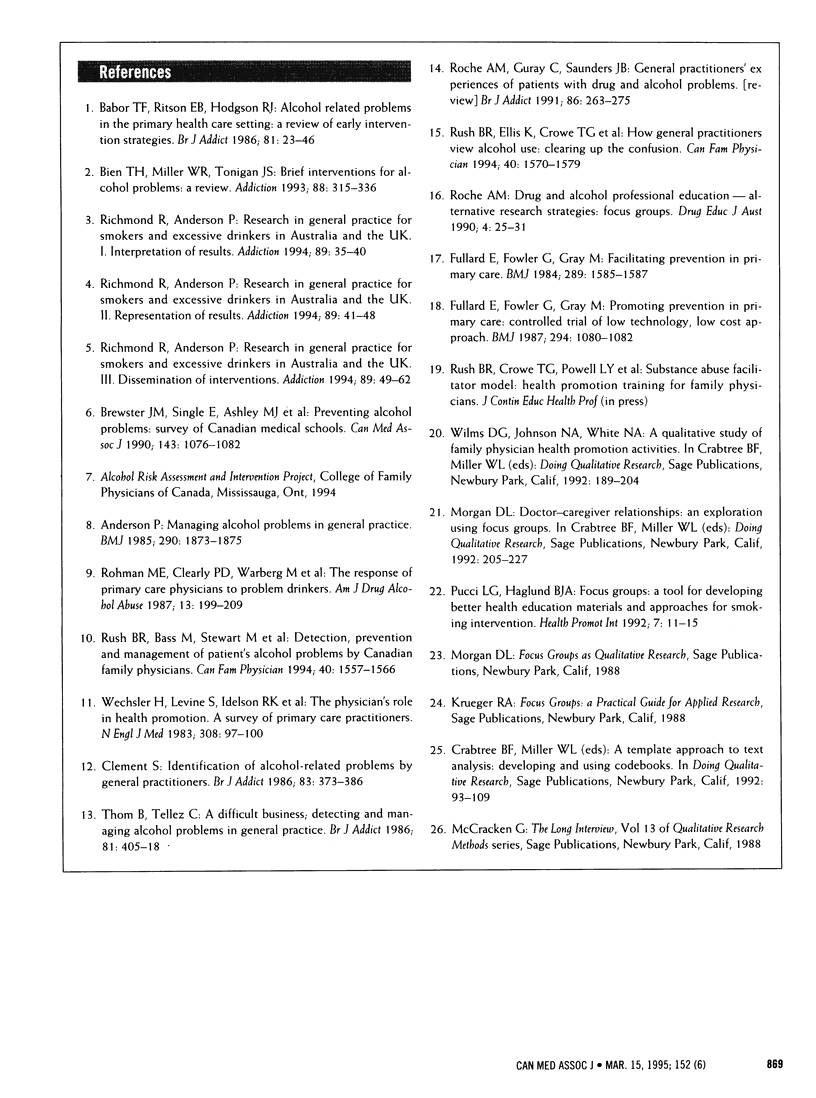
Selected References
These references are in PubMed. This may not be the complete list of references from this article.
- Anderson P. Managing alcohol problems in general practice. Br Med J (Clin Res Ed) 1985 Jun 22;290(6485):1873–1875. doi: 10.1136/bmj.290.6485.1873. [DOI] [PMC free article] [PubMed] [Google Scholar]
- Bien T. H., Miller W. R., Tonigan J. S. Brief interventions for alcohol problems: a review. Addiction. 1993 Mar;88(3):315–335. doi: 10.1111/j.1360-0443.1993.tb00820.x. [DOI] [PubMed] [Google Scholar]
- Brewster J. M., Single E., Ashley M. J., Chow Y. C., Skinner H. A., Rankin J. G. Preventing alcohol problems: survey of Canadian medical schools. CMAJ. 1990 Nov 15;143(10):1076–1082. [PMC free article] [PubMed] [Google Scholar]
- Fullard E., Fowler G., Gray M. Facilitating prevention in primary care. Br Med J (Clin Res Ed) 1984 Dec 8;289(6458):1585–1587. doi: 10.1136/bmj.289.6458.1585. [DOI] [PMC free article] [PubMed] [Google Scholar]
- Fullard E., Fowler G., Gray M. Promoting prevention in primary care: controlled trial of low technology, low cost approach. Br Med J (Clin Res Ed) 1987 Apr 25;294(6579):1080–1082. doi: 10.1136/bmj.294.6579.1080. [DOI] [PMC free article] [PubMed] [Google Scholar]
- Richmond R. L., Anderson P. Research in general practice for smokers and excessive drinkers in Australia and the UK. I. Interpretation of results. Addiction. 1994 Jan;89(1):35–40. doi: 10.1111/j.1360-0443.1994.tb00847.x. [DOI] [PubMed] [Google Scholar]
- Richmond R. L., Anderson P. Research in general practice for smokers and excessive drinkers in Australia and the UK. II. Representativeness of the results. Addiction. 1994 Jan;89(1):41–47. doi: 10.1111/j.1360-0443.1994.tb00848.x. [DOI] [PubMed] [Google Scholar]
- Richmond R. L., Anderson P. Research in general practice for smokers and excessive drinkers in Australia and the UK. III. Dissemination of interventions. Addiction. 1994 Jan;89(1):49–62. doi: 10.1111/j.1360-0443.1994.tb00849.x. [DOI] [PubMed] [Google Scholar]
- Roche A. M., Guray C., Saunders J. B. General practitioners' experiences of patients with drug and alcohol problems. Br J Addict. 1991 Mar;86(3):263–275. doi: 10.1111/j.1360-0443.1991.tb01779.x. [DOI] [PubMed] [Google Scholar]
- Rohman M. E., Cleary P. D., Warburg M., Delbanco T. L., Aronson M. D. The response of primary care physicians to problem drinkers. Am J Drug Alcohol Abuse. 1987;13(1-2):199–209. doi: 10.3109/00952998709001509. [DOI] [PubMed] [Google Scholar]
- Rush B., Bass M., Stewart M., McCracken E., Labreque M., Bondy S. Detecting, preventing, and managing patients' alcohol problems. Can Fam Physician. 1994 Sep;40:1557–1566. [PMC free article] [PubMed] [Google Scholar]
- Rush B., Ellis K., Crowe T., Powell L. How general practitioners view alcohol use. Clearing up the confusion. Can Fam Physician. 1994 Sep;40:1570–1579. [PMC free article] [PubMed] [Google Scholar]
- Thom B., Téllez C. A difficult business: detecting and managing alcohol problems in general practice. Br J Addict. 1986 Jun;81(3):405–418. doi: 10.1111/j.1360-0443.1986.tb00347.x. [DOI] [PubMed] [Google Scholar]
- Wechsler H., Levine S., Idelson R. K., Rohman M., Taylor J. O. The physician's role in health promotion--a survey of primary-care practitioners. N Engl J Med. 1983 Jan 13;308(2):97–100. doi: 10.1056/NEJM198301133080211. [DOI] [PubMed] [Google Scholar]


